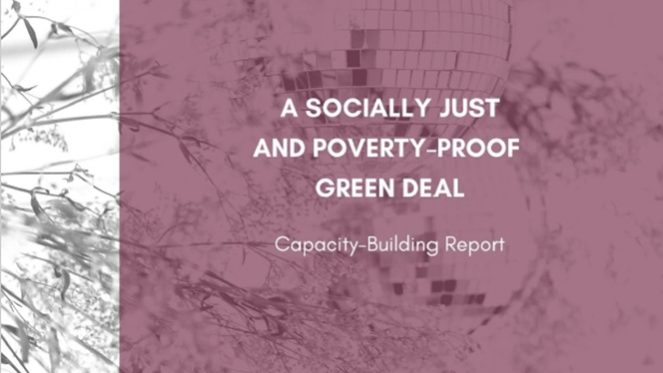Fifty million households around Europe are currently suffering from energy poverty. This means they cannot sufficiently light, heat or cool their homes. Energy poverty is rooted in structural causes – which span across the current economic, energy, climate, taxation, social, employment, welfare, health, and housing policies. The main drivers of energy poverty are low income, poor energy efficiency in buildings and unfair energy prices. The COVID-19 pandemic and the recent explosion in energy prices have exacerbated the situation as people are stuck in inefficient houses with expensive and polluting fossil gas infrastructure.
The Fit for 55 packages, adopted by the European Commission in July 2021, aims to “deliver the European Green Deal”, making the EU’s climate and energy policies fit for reducing greenhouse gas emissions (of 55% by 2030), while mitigating the costs of the green transition for those most exposed to the risk of energy poverty.
Social justice must be at the core of energy and climate policies in order to address the multidimensional causes of energy poverty. Some such policies may include: subsidised deep renovation programmes, socially inclusive decarbonisation of heating and cooling systems, and access to resilient social protection measures, including adequate minimum income. Moreover, in the context of the transition to a low-carbon economy, a clear commitment to upskilling and reskilling of workers is crucial to ensure the access to new green jobs. To realise the ambition of a socially just transition that leaves no one behind, environmental and social justice must go hand-in-hand. Poverty-proof solutions must be a win-win opportunity to deliver on climate targets and reduce inequality and poverty at the same time.
In this context, tax justice plays a pivotal role. Climate policies and levies must not disproportionately impact low-income households, leaving them to pay a higher price for the green transition. Taxes on heating fuels and electricity deeply influence the regressivity of levies. On the contrary, the shift from fossil fuel subsidies to sustainable incentives for vulnerable households would contribute to progressive and greener tax systems.
Moreover, structural socio-economic inequalities affecting women put them and their households at higher risk of energy poverty with serious implications for their health and their full participation in society. EAPN advocates for women, vulnerable groups, and people experiencing poverty to meaningfully participate in the design and implementation of programmes and investments for decarbonisation and carbon neutrality.
EAPN pursued five main objectives with this workshop: A Socially Just and Poverty-Proof Green Deal:
- To present the key challenges and opportunities of Delivering on the European Green Deal and the Renovation Wave strategy for Europe’s energy poor.
- To develop a solid narrative about the socio-economic and environmental benefits of access to clean and affordable energy, and decent housing, for all.
- To foster the exchange of lessons learnt at national and EU level, including good practises and advocacy actions.
- To stimulate members’ reflection on optimal integration of national knowledge and practices into EU advocacy plans on a socially-just transition, and assessment of EU actions’ influence on national advocacy plans.
- To reinforce the synergy and consistency of joint work between environmental and social NGOs.
This event brought together EAPN members from the EU Inclusion Strategies Group and the Executive Committee, Isabelle Brachet – EU Fiscal Reform Policy Coordinator from the Climate Action Network Europe (CAN), Martha Myers – Climate Justice and Energy Campaigner at Friends of the Earth Europe (FoEE), and coordinator of the Right to Energy Coalition, Lidija Živčič – Senior Expert and Project Leader at the Focus Association for Sustainable Development (partner of EmpowerMed), Timothy Gore – Head of Low Carbon & Circular Economy at the Institute for European Environmental Policy (IEEP), and members of the Right to Energy Coalition such as Ting Zhang – Senior Officer for the European Climate Foundation (ECF), and Louise
Sunderland – Senior Advisor at the Regulatory Assistance Project (RAP).



